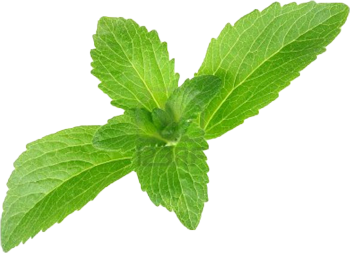|
Stevia herb parts
are very low in calories. Parts by parts its dry leaves are roughly 40 times
sweeter than sugar. The sweetness of sugar in stevia is due to several
glycoside compounds including stevioside, steviolbioside, rebaudiosides A-E,
and dulcoside.
Stevioside is
non-carbohydrate glycoside compound. Hence, it lack of properties that sucrose
and other carbohydrates have. Stevia extracts, like rebaudioside-A, are found
to be 300 times sweeter than sugar. In contrast to sugar, however, stevia
extracts have several unique properties such as long shelf life, high
temperature tolerance, non-fermentative; but contain near-zero calories.
In addition,
stevia plant has many sterols and antioxidant compounds like triterpenes,
flavonoids, and tannins. Some of flavonoid polyphenolic anti-oxidant
phyto-chemicals present in stevia is kaempferol, quercetin, chlorogenic acid,
caffeic acid, isoquercitrin, isosteviol…etc. Studies found that kaempferol can
reduce risk of pancreatic cancer by 23% (American journal of epidemiology) .
Chlorgenic acid
reduces enzymatic conversion of glycogen to glucose in addition to decreasing
absorption of glucose in the gut. Thus, it helps reduce blood sugar levels. The
lab studies also confirm a reduction in blood glucose levels and an increase in
the liver concentrations of glucose-6-phosphate and of glycogen.
Certain
glycosides in stevia extract have been found to dilate blood vessels, increase
sodium excretion, and urine output. In effect, stevia, at slightly higher doses
than as sweetener, can help lower blood pressure.
Being a
non-carbohydrate sweetener, stevia would not favour the growth of Streptococcus
mutants’ bacteria in the mouth which is attributed to be a causative agent for
dental caries and tooth cavities. On the other hand, certain compounds in
stevia are rather found to inhibit caries causing bacteria in the mouth.
In addition,
being a herb, stevia contain many vitals minerals, vitamins that are
selectively absent in the artificial sweeteners.
Diabetic Control: The most important or widely praised aspect of stevia for human
health concerns its ability to regulate blood sugar levels in the body. Opposed
to sucrose, which is what normal table sugar consists of, stevia sweetens food
in a similar way as sugar, but it contains stevioside, which is a
non-carbohydrate glycoside compound. As explained above, when stevioside breaks
down, the glucose-containing particles are absorbed by the bacteria in the
colon, rather than being absorbed by the bloodstream and affecting glucose
levels in the body. This is an ideal replacement for normal sugar for diabetics
or people on carbohydrate-controlled diets, because they can eat sweet foods
without having to worry about diabetic complications.
Weight Loss: Stevia is very low in calories and is anywhere from 40-300x
sweeter than sugar, depending on the prevalence of certain extracts in the
species variety. This means that people can eat foods like cakes, cookies, and
candies made with stevia without worrying about gaining a great deal of
calories from sugars, so they won’t hurt their chances of successfully losing
weight.
Blood Pressure: As mentioned, stevioside is a type of glycoside, but there are
other glycosides in stevia that can actually relax the blood vessels, increase
urination, and facilitate the elimination of sodium from the body. This means
that less stress is put on the cardiovascular system and there can be a drop in
blood pressure, which protects heart health and prevents certain conditions
such as atherosclerosis, heart attacks, and strokes.
Oral Health: Stevia has been found to reduce bacterial formation in the
mouth, making it a popular additive for toothpastes and mouthwashes. It also
prevents cavities and gingivitis, which sucrose certainly doesn’t do!
Skin Health: In a similar antibacterial function as it plays in the mouth,
stevia has been found to be a useful topical application for skin conditions
such as eczema and dermatitis. It inhibits the spread of bacteria and acts as a
steroid in these situations, making it a popular option for many people who
can’t get relief from these conditions.
Bone Health: Although this hasn’t been extensively tested in humans, certain
studies have shown that chickens that have been fed a stevia diet lay
significantly thicker shells that contain a much higher content of calcium than
average eggs. This has been extrapolated into humans, meaning that it could
potentially help build stronger bones and decrease the chances of osteoporosis.
Cancer Prevention: The wide range of antioxidant compounds found in stevia make it
an ideal dietary supplement for cancer prevention. Quercetin, kaempferol, and
the other glycoside compounds in stevia help to eliminate free radicals in the
body, thereby preventing them from mutating healthy cells into cancer cells.
Antioxidants also help to prevent premature aging, cognitive malfunction, and
various other serious conditions like heart disease.
|

